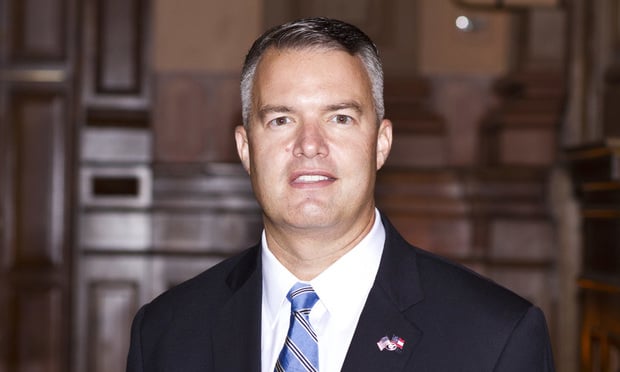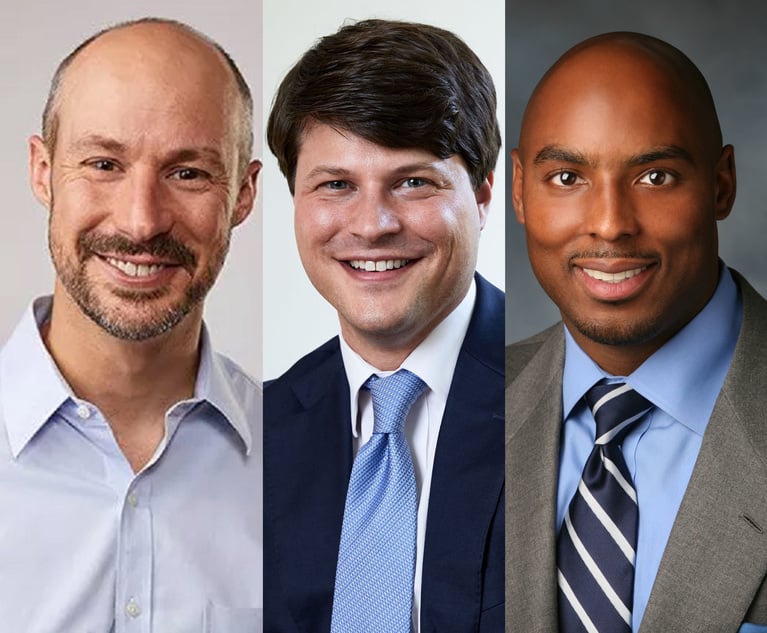Questions for the Bench: Judge Trent Brown of the Georgia Court of Appeals
"If your case involves easily misunderstood facts, an issue of first impression, a conflict in the law or what I like to call a 'reasonable minds on the fence case,' oral argument can definitely be of benefit."
April 08, 2019 at 02:22 PM
6 minute read
 Judge E. Trenton Brown III, Georgia Court of Appeals (Photo: John Disney/ALM)
Judge E. Trenton Brown III, Georgia Court of Appeals (Photo: John Disney/ALM)
Our latest question-and-answer session of a Georgia judge takes a look at Judge Trenton “Trent” Brown III of the Georgia Court of Appeals. He offers his thoughts on language in motions for reconsideration, the types of cases in which oral argument can be particularly effective and his willingness to go to try new experiences to build collegiality on the bench.
Number of years on the bench:
Eleven years. I was appointed by Gov. Sonny Perdue to the State Court of Putnam County in 2008. In 2012, I was appointed by Gov. Nathan Deal to the Ocmulgee Judicial Circuit, a circuit of eight counties in Middle Georgia. After I served 10 years as a trial judge, Gov. Nathan Deal appointed me to the Georgia Court of Appeals in May 2018.
What prompted you to seek a job on the trial court bench and then the appeals court?
Beginning as a law student intern with the Ocmulgee District Attorney's Office and later into private practice, I appeared regularly in the courtrooms of the Ocmulgee Judicial Circuit. Appearing before Judge Jesse Copelan of the State Court of Putnam County, Chief Judge Billy Prior and the other judges of the Ocmulgee Circuit inspired me to also serve these communities as a member of the judiciary. I enjoyed my time on the trial bench immensely and would have counted myself lucky to retire from that position after a long and rewarding career as a trial judge. After 10 years of service, I was honored by an opportunity from Gov. Nathan Deal to serve on the Georgia Court of Appeals.
How is judging different between running a single courtroom and participating in panels?
Both trial judges and appellate judges need to be able to make a decision. All judges, whether solo on the bench or one of a panel of three are making tough calls daily. The biggest difference between the two is the amount of time and deliberation provided to appellate judges. A trial judge must frequently make decisions in the moment, based on contemporaneous arguments of counsel and innate knowledge of the law with little or no assistance from staff. At the Court of Appeals, each judge has three career staff attorneys to assist in the process of coming to the right result, as well as colleagues on the panel. It is much more of a team effort.
What do you like most about being a judge?
All those that enter the judicial process, first and foremost, want victory for their cause. That's understandable. But they also seek closure in a fair environment. Serving in a justice system that provides neutral and unbiased resolution to the parties gives me great job satisfaction. I hope that every party that comes before me, even if they lose, knows that they were given a fair opportunity to be heard and state their case.
What keeps you up at night as a judge?
Being wrong. Whether in a trial court regarding the custody of a child or in an appellate decision fortifying an inappropriate standard that might be applied numerous times before it can be corrected.
What are your pet peeves in briefs and arguments?
A lack of professionalism. Whether it be in a courtroom or pleading, body language and words matter. I have been particularly surprised by the language unsuccessful counsel are willing to use in their motions for reconsideration.
What characteristic(s) do successful advocates before you share?
A deep understanding of the facts of the case and the relevant law, coupled with being “good on their feet” and not tied to a script.
When making a decision, do you tend to look for proper legal reasoning to support a particular answer, or do you follow the legal reasoning to a particular conclusion?
I want to be right, regardless of process or outcome. Admittedly, I may enter a case or argument with a gut reaction to what should be an appropriate outcome, but I never work toward it. Law should and always will control. I've often said I'd rather be painfully right than comfortably close to it. It's been said to the point of cliche, if you're comfortable with the outcome of all your opinions and orders, you are doing it wrong.
If you have an inkling about how you'll rule on a question before hearing oral argument, how often does oral advocacy change your mind?
It truly depends on the case. If the law is against you, no amount of writing, oral argument or ball-hiding is going to change the outcome. If your case involves easily misunderstood facts, an issue of first impression, a conflict in the law or what I like to call a “reasonable minds on the fence case,” oral argument can definitely be of benefit.
What U.S. Supreme Court justice who served in the past 20 years would you like to emulate and why?
My answer relates more to interpersonal relationships with colleagues than any particular philosophy regarding the law. I admire Chief Justice William Rehnquist's ability to build warm personal relationships with his ideological opposites. He was known for his easygoing, humorous and unpretentious personality; Justice William Brennan described him as his “best friend” on the court. I also respect the friendship that existed between Justice Antonin Scalia and Justice Ruth Bader Ginsburg despite their ideological disagreements. I am not sure if opera will be the conduit to forge similar friendships on Georgia's Court of Appeals, but I am always open to new experiences.
What is your approach to stare decisis? Under what circumstances would you vote to overturn a precedent?
We must give due weight to the decisions that precede our own. However, if wrong and in our power to correct, we must do that as well.
How would you describe the role of the judicial branch in the separation of powers?
Put simply, the judiciary should stay in our own lane. The fastest way to open a door to intrusion, political or otherwise, is to show a willingness to pursue lawmaking in the form of inappropriate judicial activism.
What are your views regarding the use of nonprecedential opinions, such as unpublished opinions and judgment-only concurrences, in the Court of Appeals?
They have a place, particularly with regard to the efficiency of our court, one of the busiest in the nation with very tight deadlines for an opinion to be issued. In my chamber, I have very detailed conversations with my staff about each opinion and whether it would be beneficial to the overall body of law for it to be published. I tend to err on the side of publishing.
This content has been archived. It is available through our partners, LexisNexis® and Bloomberg Law.
To view this content, please continue to their sites.
Not a Lexis Subscriber?
Subscribe Now
Not a Bloomberg Law Subscriber?
Subscribe Now
NOT FOR REPRINT
© 2025 ALM Global, LLC, All Rights Reserved. Request academic re-use from www.copyright.com. All other uses, submit a request to [email protected]. For more information visit Asset & Logo Licensing.
You Might Like
View All

Spalding Jurors Return $12M Verdict Against State Farm Insurance Client
10 minute readTrending Stories
- 1SEC Files Lawsuit Against Elon Musk Over Untimely Twitter Ownership Disclosure
- 2Survey Finds Majority of Legal Professionals Still Intimidated by AI Despite Need to Streamline Mounting Caseloads
- 3FTC Launches Inquiry of Single-Family Rental Home 'Mega Investors,' Issues PBM Report
- 4Womble Bond Dickinson's Wilmington Office Sees New Leadership as Merger Is Completed
- 5Defending Against a $290M Claim and Scoring a $116M Win in Del. Drug Patent Fight
Who Got The Work
J. Brugh Lower of Gibbons has entered an appearance for industrial equipment supplier Devco Corporation in a pending trademark infringement lawsuit. The suit, accusing the defendant of selling knock-off Graco products, was filed Dec. 18 in New Jersey District Court by Rivkin Radler on behalf of Graco Inc. and Graco Minnesota. The case, assigned to U.S. District Judge Zahid N. Quraishi, is 3:24-cv-11294, Graco Inc. et al v. Devco Corporation.
Who Got The Work
Rebecca Maller-Stein and Kent A. Yalowitz of Arnold & Porter Kaye Scholer have entered their appearances for Hanaco Venture Capital and its executives, Lior Prosor and David Frankel, in a pending securities lawsuit. The action, filed on Dec. 24 in New York Southern District Court by Zell, Aron & Co. on behalf of Goldeneye Advisors, accuses the defendants of negligently and fraudulently managing the plaintiff's $1 million investment. The case, assigned to U.S. District Judge Vernon S. Broderick, is 1:24-cv-09918, Goldeneye Advisors, LLC v. Hanaco Venture Capital, Ltd. et al.
Who Got The Work
Attorneys from A&O Shearman has stepped in as defense counsel for Toronto-Dominion Bank and other defendants in a pending securities class action. The suit, filed Dec. 11 in New York Southern District Court by Bleichmar Fonti & Auld, accuses the defendants of concealing the bank's 'pervasive' deficiencies in regards to its compliance with the Bank Secrecy Act and the quality of its anti-money laundering controls. The case, assigned to U.S. District Judge Arun Subramanian, is 1:24-cv-09445, Gonzalez v. The Toronto-Dominion Bank et al.
Who Got The Work
Crown Castle International, a Pennsylvania company providing shared communications infrastructure, has turned to Luke D. Wolf of Gordon Rees Scully Mansukhani to fend off a pending breach-of-contract lawsuit. The court action, filed Nov. 25 in Michigan Eastern District Court by Hooper Hathaway PC on behalf of The Town Residences LLC, accuses Crown Castle of failing to transfer approximately $30,000 in utility payments from T-Mobile in breach of a roof-top lease and assignment agreement. The case, assigned to U.S. District Judge Susan K. Declercq, is 2:24-cv-13131, The Town Residences LLC v. T-Mobile US, Inc. et al.
Who Got The Work
Wilfred P. Coronato and Daniel M. Schwartz of McCarter & English have stepped in as defense counsel to Electrolux Home Products Inc. in a pending product liability lawsuit. The court action, filed Nov. 26 in New York Eastern District Court by Poulos Lopiccolo PC and Nagel Rice LLP on behalf of David Stern, alleges that the defendant's refrigerators’ drawers and shelving repeatedly break and fall apart within months after purchase. The case, assigned to U.S. District Judge Joan M. Azrack, is 2:24-cv-08204, Stern v. Electrolux Home Products, Inc.
Featured Firms
Law Offices of Gary Martin Hays & Associates, P.C.
(470) 294-1674
Law Offices of Mark E. Salomone
(857) 444-6468
Smith & Hassler
(713) 739-1250








